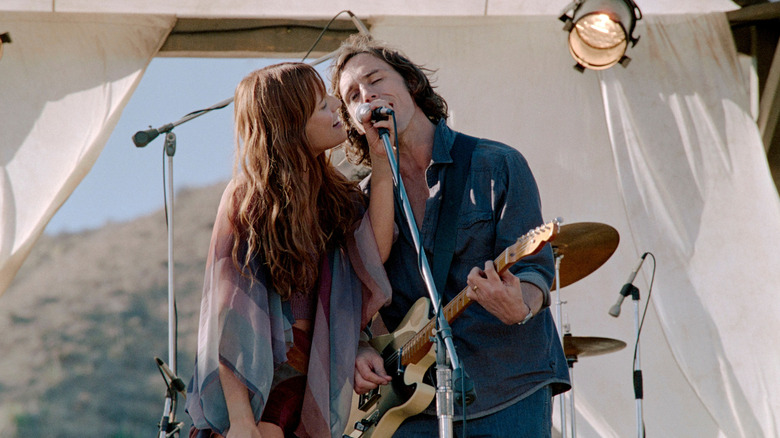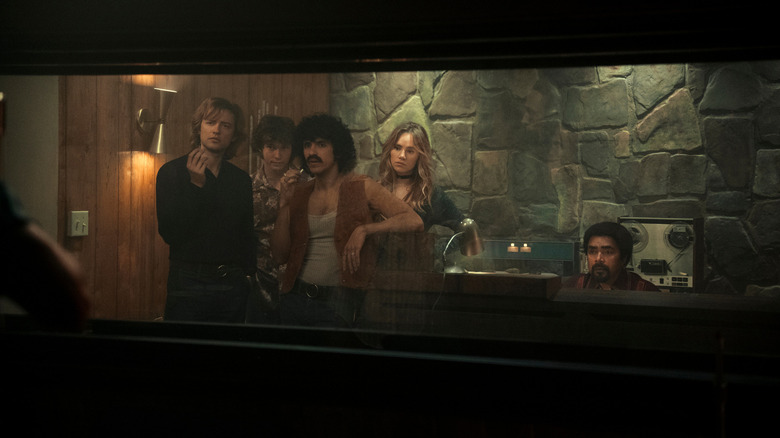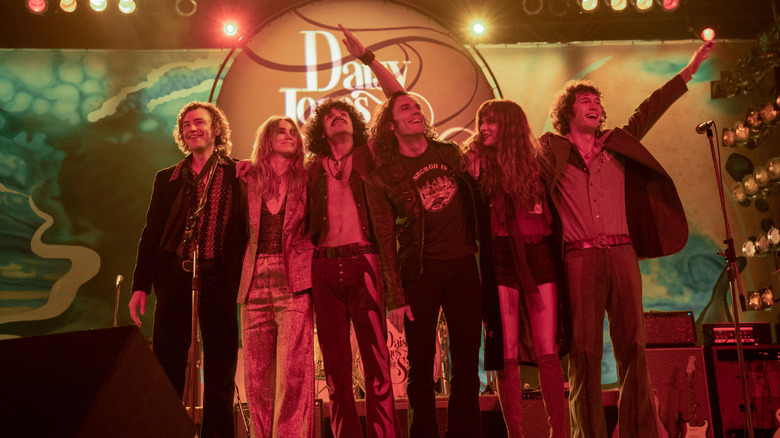
This piece contains slight spoilers for "Daisy Jones & The Six."
It is difficult to make music sound timeless. Even the greatest songs ever released often feel indicative of when they were released, whether it's through the production quality or the pointed lyrics. This is precisely why accurate music and music direction are so important in period pieces — the right music instantly gets audiences into the appropriate mindset.
One would imagine that "Daisy Jones & The Six," the Prime Video adaptation of Taylor Jenkins Reid's bestselling novel, would be the same. After all, it centers around a popular band that hit its peak in the 1970s, a time historically known for its fantastic music in all genres, from disco to rock. Unfortunately, that isn't really the case. "Daisy Jones & The Six" approaches its music in a bizarrely modern way, seemingly outcasting the band's clear real-world influences for something that just sounds too sanitized for its own good.
We Could Make A Good Thing Bad

The first signs of this strange decision came in last week's episode, "Track 3: Someone Saved My Life Tonight," which saw Daisy (Riley Keough) meet the struggling Six at the suggestion of influential music producer Teddy Price (Tom Wright). While she and Six frontman Billy Dunne (Sam Claflin) butt heads over the lyrics of his song "Honeycomb," they both agree that the instrumentals provided by the rest of the band don't need to be changed.
This should probably be made clear — the songwriters and musicians tasked with bringing the fictional band's music to life are very talented people. The fact that they were able to record an entire album's worth of music based on the few details provided in the original book is extremely commendable. However, when actually listening to the songs, it's very hard to imagine them being released at any other time besides 2023. There is a difference between paying homage to the rock of the 1970s and actually producing an album that sounds like it could have been released in the 1970s.
Considering "Daisy Jones & The Six" takes direct inspiration from Fleetwood Mac, let's use their classic album "Rumours" as a comparison. Even with the remasters that have been released over the years, "Rumours" still sounds a bit staticky, fuzzy, and not the most finely tuned. This is a present sound throughout most music of the time, and it's not exactly something you're able to smooth away with modern tech, even if you can replicate it.
Indicative Of A Larger Problem

The team behind "Daisy Jones & The Six," however, doesn't even try to replicate this audio fuzziness that makes '70s rock so distinct. It sounds too smooth and too polished to be from the time period it was fictionally released in. Keough and Claflin, despite their genuine talents, sound too perfectly practiced to mirror their grungy and troubled characters, and the backing band sounds like any other soft rock backing band of this time. There is nothing separating the music of this show from anything else being released today.
This problem is not just limited to the music, however. The entire show feels like it has no idea what era it wants to be in — even though the primary story has a decent aesthetic grasp on the '70s, the interview segments don't attempt to be shot in the 1990s like they supposedly are (they take place 20 years after their breakup). There is no special filter that makes the shot more grainy, not to mention that there is almost no aging makeup put on its actor subjects. It's like the show is too afraid of committing too much to the time periods they claim to be inspired by.
It really is a shame that "Daisy Jones & The Six" doesn't want to take advantage of its own time period. There are simply too many small details piling up that take away from the show's immersion to ignore, and ironically enough, the music is when the immersion just falls apart.
Read this next: Why These Actors Left Hit TV Shows
The post Daisy Jones & the Six is Great, But is Failing in One Key Area appeared first on /Film.
